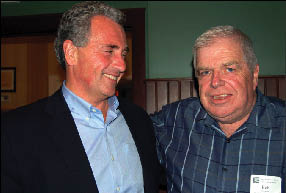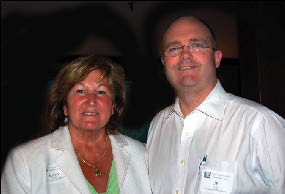Many of the region's leading hotel experts recently gathered for the Northeast Lodging Roundtable to share their unique perspectives on new trends and growing challenges facing their industry.The industry insiders' freewheeling conversation explored a wide range of topics, including brand proliferation, price escalation, rate resistance, room supply and economic forecasts.
The overall health of the hotel industry drew the groups' first comments, as some industry spokesmen around the country have begun to turn pessimistic and fear that the end of a prosperous hotel cycle is looming. But barring any unforeseen catastrophe, the consensus of the panelists was optimistic—at least for the next few years.
"I do not see a downturn in the northeast for the next year or two," said Rachel Roginsky, principal of the Pinnacle Advisory Group, a hospitality consulting firm based in Boston The northeast economic trends tend to follow suit with the national economy, and the hotel industry tends to lag the overall U.S. economy by six months. "Although, there is a lot happening, I think for the next year or two, for the short term, we expect to see occupancy continue at slow to modest growth, and we certainly expect to see rate growth continue," she said.
Henry Vickers Jr., principal at Boston's AEW Capital Management and head of the firm's hospitality group, had a similar projection for the coming years. "There was a lot of hand wringing the last several months," he said. "Occupancies have peaked and demand has been stagnant. Corporate spending has turned modestly negative. It is not negative to the extant we've usually seen in recessions. But I think we are just coming out of that now," said Vickers.
A healthy hotel market "is going to last for the next couple of years—could be three," said Vickers. "I think things are going to be pretty good, but not as robust as they were for the past few years." There was less agreement on the issue of an over-supply of properties currently on the market and in the development pipeline.
"We are beginning to see a huge balloon in supply in hotels built," said Bob Crawford, president of Hospitality Resolutions Inc., based in Natick, Mass. But if some of that development can be shifted into the future, "all we are going to do is replace the stock that is going to be moving out," he predicts. "I don't feel the supply side is really that blue," said Crawford.
But according to James O'Connell, principal of O'Connell Hospitality Group, a hotel brokerage based in Boston new hotel development does not replace older properties. "I think it just drifts down into the lower depths," said O'Connell. "It goes from a Holiday Inn to a Holiday Express, but it is still rooms in the market."
O'Connell cited the Augusta, Maine, market, where a 50% occupancy rate in an area carrying six limited-service hotels has not curtailed the addition of two new mid-service hotels about to be added to the already severe competition for too few guests.
In fact, the RevPAR premiums enjoyed by many of the select-service hotels, such as Hampton, Residence and Courtyard, over the past decade cannot be supported ad infinitum as lifestyle properties, new brands and supply continue to flood the market. But the market and consumers appear to be driving the development trend. According to a recent study by Crawford in the Framingham, Mass., market, the demand for budget properties declined 18% over a 5-year period, while the demand for new-to-market select-service hotels grew 20% over the same period. "People are looking for newer and better product," said Crawford. "And they are willing to pay more."
The demand topic naturally led into a discussion of an issue vital to everyone on the operational side of the hotel industry room pricing. Room rates have been rising, but panelists were in agreement that pricing has not reached exorbitant levels. In fact, according to Roginsky's figures, New England's rates have not recovered to year 2000 levels. But she did warn of price sensitivity flaring up in Boston's convention-traveler market.
Kenneth MacKenzie, a director at the Boston law firm of Goulston & Storrs' hospitality and recreation group, took a classic economic approach to pricing. "They are not becoming overpriced until occupancy goes the wrong way," he said. MacKenzie does believe that the branded hotels' ability to tap the business traveler's appetite for reward points is a sustaining advantage. But he does see pricing pressure potentially affecting leisure traveler decision-making.
As the total number of hotels has multiplied in the Northeast, so too has the number of hotel brands. There are over 300 brands in existence nationwide, and 80 new brands were introduced in the past three years. "I do not think there is a brand that stayed true to itself for more than a few years," said Harry Wheeler, a principal at Group One Partners Inc., a Boston architecture firm, describing the effects of the intense competition in the market. "I think there are getting to be too many brands," he added. The explosion of hotel development has coincided with construction costs that have far outpaced inflation, as the worldwide demand for building materials continues apace.
"Overall, the costs are very high," said J.P. Ford, senior vice president of National Hotel Realty, based in Portsmouth, N.H. The net result is longer lead times and budgets that have to be readjusted every few months. But the supply keeps coming, according to Ford. "We think this fall and winter, you will see a lot of pipeline coming online."
Yet, Crawford believes that 20% of the proposed projects are being turned down because the construction costs are too prohibitive for the market rates. Costs of $230 per s/f to build in an urban environment are a real bargain, according to Wheeler. He has seen pricing go over $300 per s/f. His urban clients are consistently asking to incorporate other components, such as restaurants, retail and condos, into a hotel development to justify the pricing. "What else can we get in here for a demand generator?" is a comment Wheeler frequently hears.
In the suburban markets, levels have reached $140 per s/f, nearly a doubling in four years. The roundtable concluded with thoughts on the impact of private equity's recent spending and selling sprees in the hotel industry. The Blackstone Group, for example, acquired the Extended Stay America chain for $2.5 billion and sold it for $8 billion. "I did not think at the time that they even had a coherent strategy," said Crawford.
"They have captured our assets before," said Crawford, characterizing Wall Street's investment history with the hotel industry, "and they have broken them and given them back to us." O'Connell described private equity as the "next keepers of the gate."
The panel was cautious and wary about the possible fallout from the aggressive investment of private equity chasing the cash flow of hotels and a willingness to pay dangerously high rates for it. "Until interest rates go up and yields are there, they are going to continue to place this cash," said O'Connell.













